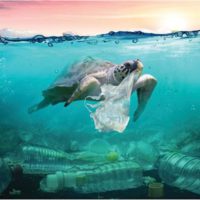Major Distributors Take a Cue to Curb Plastic Pollution

Plastic and nature have one of the most interestingly circular relationships. In one of those “history repeats itself” moments, periodicals in the mid-19th century warned the public about the imminent extinction of elephants whose tusks were being removed at an alarming pace to produce billiard balls. Almost every wealthy American and European home sported a billiards table at the time yet one entire tusk could make three balls at most and only if that tusk was faultless.
In 1863, a billiards supplier in New York offered ten-thousand dollars in gold (worth around $3 million today) to anyone who could come up with an ivory substitute. An amateur inventor by the name of John Wesley Hyatt began experimenting with the highly unstable mixture of nitric acid and cotton (nitrocellulose) and, seven years later, developed a material that was as hard as ivory, resistant to water and oil, and could be molded or pressed into thin sheets.
Wyatt dubbed this invention “celluloid” and thus began the plastic revolution. Although it never became the prize-winning substitute for billiard balls, celluloid was patented as a substitute for tortoise shell combs among other things. A pamphlet by Hyatt’s company stated “celluloid (has) given the elephant, the tortoise, and the coral insect a respite in their native haunts; and it will no longer be necessary to ransack the earth in pursuit of substances which are constantly growing scarcer.”
It is irony in its true form that an invention intended to curb wildlife destruction has now become one of its biggest threats. According to the World Economic Forum, plastic will outweigh fish in the world’s oceans by 2050. Microplastic pollution is so widespread and daunting that we haven’t even begun to understand its perilous effects. Over one-fourth of all plastic is used for packaging, while only 14 percent is collected for recycling. Staggeringly, 91 percent of all plastic is not recycled at all. What this means for business is that 95 percent of plastic packaging material value (estimated to range from $80 to $120 billion) is lost to the economy.
Enter TerraCycle, the startup partnering with some of the largest consumer goods companies in the world to curb plastic waste. Procter & Gamble, Unilever, Nestlé, PepsiCo, and Mondelēz International are among those partnering with TerraCycle to develop packaging that can be reused up to 100 times in some instances. TerraCycle uses this packaging in its Loop distribution program, offering up to 300 items — ranging from laundry detergent to ice cream — which it collects, sanitizes, and refills.
Loop’s customers order their partners’ products via the Loop Store online and place a fully refundable deposit during checkout (ranging from $0.25 for a bottle of Coke to $47 for a diaper genie). When the products have been used, the customers fill a tote with the empty containers and a UPS driver picks them up. Customers are not responsible for maintaining the integrity of the packages, only for returning them to get their deposit back. TerraCycle hopes that by using this method, companies will invest in more durable product packaging using stainless steel, aluminum, or glass.
TerraCycle wooed their partners by asking them to reconsider their packaging strategy. Most companies sell both their product and package to a consumer and leave it up to them to recycle it (or not). With Loop, a company would retain ownership of the package and therefore be able to claim tax cuts by counting it as a long-term asset. TerraCycle earned $33 million in revenue in 2018, a 38 percent increase from the previous year. Hopefully, more companies take a cue from yesteryear’s billiard-ball ivory threat and today’s ocean-pollution crisis to help close the “loop” hole in recycling.
